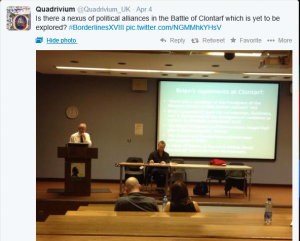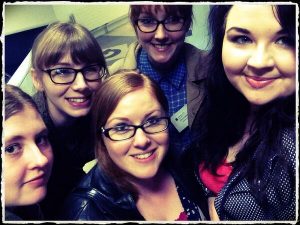This year’s Borderlines conference was held at University College Cork and hosted delegates from all over Ireland, the UK and further abroad. The theme was ‘Power and Influence’, inspiring a diverse selection of papers that demonstrated just how wide-ranging are the interests of current post-graduate researchers in the fields of Medieval and Early Modern studies. Queen’s University Belfast sent several delegates on the 6 hour journey to Cork to present papers and we were incredibly impressed with the smooth-running organisation of the conference and appreciative of the warm welcome received. Presenting papers from QUB were Duncan Berryman, Natalie Calder, Margaret Tedford, Rachel Reid, Sonja Kleij and Clíodhna McAllister (not forgetting QUB alum/Uni of York student Emma Martin).
Day one kicked off with a rousing panel on the materiality of power. Other notable panels of the weekend demonstrated approaches to gendered power, political and religious influences, the power of music, absences of power and knowledge as a source of power. We were particularly excited to hear papers from last year’s Trinity College Dublin organisers; Greg Hulsman’s paper entitled “‘Hit were to witte how comynes schulden serv God and mon’: Lollardy and the Influence of the Church and the Nobility on the Third Estate” and Caoimhe Whelan speaking on ‘The Influence of Giraldus Cambrensis in fifteenth century Ireland’. It is always interesting to be educated on areas of research far outside one’s own comfort zone. With that in mind I’d like to say I especially enjoyed Patricia Walker’s (TCD) paper on murder pamphlets and Emma Osbourne’s (Glasgow) on the genetics of power, both intriguing topics that were fascinating to hear more about. It was often difficult to chose between parallel panels to attend due to the variety of topics and disciplines on offer – a compliment to all speakers. I’d also like to make special mention of our own MA student Clíodhna McAllister who successfully presented her very first paper on ‘The Body Esoteric: The Disenfranchisement of the Present’ on the Sunday morning. Giving a paper on the morning panel after the conference dinner night is no mean feat but she kept her audience engaged throughout!
The first day of the conference had been rounded off by keynote speaker Professor Seán Duffy (Trinity College Dublin) with a lecture entitled ‘Power and Influence in Medieval Ireland: the Legacy of Brian Ború’, of special interest as the conference coincided with the approach of the 1000 year anniversary of the battle of Clontarf.

As you may notice from the above photo (via @Quadrivium_UK for which we were guest tweeting), social media played an interesting role for this year’s conference. The hashtag #BorderlinesXVIII received dozens of tweets, reporting on individual papers and generating discussion between attendees. This was a great way to ‘meet’ people before networking in person and useful in finding common points of interest between papers and panels. Feel free to catch up on conference proceedings by searching out the hashtag above and following speakers if you’d like to stay up-to-date with their research.

A massive thank you and congratulations to the organisers, Aislinn, Edel and Simon, for their hard work! We had an amazing, inspiring weekend meeting with other researchers and hearing the wonderful range of papers. As always Borderlines was a positive, encouraging conference experience, allowing delegates to present in the supportive atmosphere of their peers. It was fantastic to be able to celebrate the conference’s 18th year and we hope it will continue for many more…

…speaking of which! We are looking forward to hosting another successful Borderlines when we welcome you back to Queen’s University Belfast in 2015. Keep an eye out for announcements on #BorderlinesXIX in the coming weeks.
